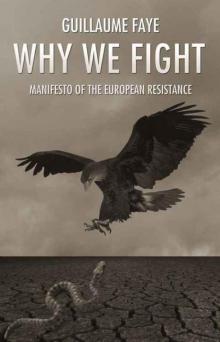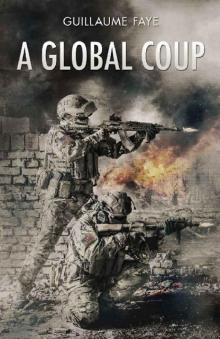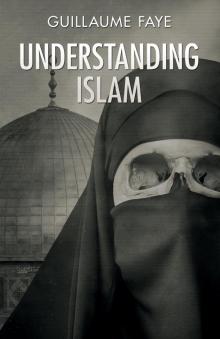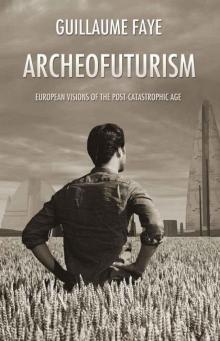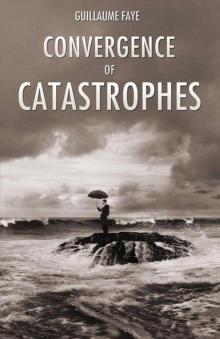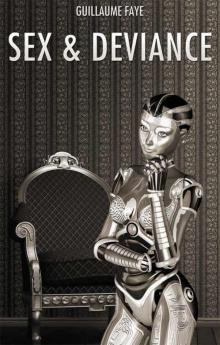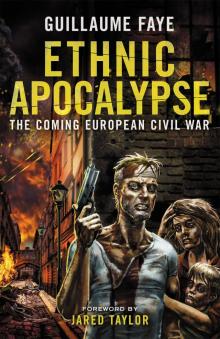Why We Fight, page 2




Faye also refuses a certain tendency to blame America for the Continent’s vassalage and her capitulation to the North African Arabs and Sub-Saharan Blacks (the ‘Beur-Blacks’) colonising her native lands and exploiting her permissive society.[18]
Europe for him has no one, ultimately, but herself to blame for the policies and social practices now destroying who she is (i.e., her identity).
At the same time, and with greater conviction, Faye believes a very real flesh-and-blood enemy — un corps étranger et parasitaire — mortally imperils Europe: the replacement populations gathered under the Prophet’s banner.
America may collude with the forces of Islam to divide and weaken Europe for the sake of her global empire,[19] and liberal modernist illusions may lead European elites to believe the Islamic colonisers can be integrated without destroying her historic family of nations — but neither of these things quite makes them an ‘enemy’.
Europe’s liberal-modernist elites and America’s world empire, Faye argues, are ‘adversaries’ of Europe — they exploit and manipulate her, but pose no direct threat to her physical existence. Islam and the peoples of the Global South, in contrast, constitute precisely such a threat, for these alien forces have explicitly designated her as the enemy they intend to destroy.[20] In colonising European lands and replacing her native peoples, they have, in fact, already begun turning Europe into a Dar-al-Islam[21] — which is eventually going to make her into an anti-Europe.
The question of Islam also affects the sectarian divides running through the ‘resistance’. Some, like Grécistes, look on tradition-minded Islam as a possible ally in the struggle against the destructuring forces of America’s anti-European world order.[22] Allied with Muslim anti-modernists opposing Americanisation, global capitalism, and the prevailing liberal-managerial system, these néo-droitistes[23] assume a stance almost antipodal to Faye’s[24] — with much of the ‘resistance’ occupying places somewhere between their respective polarities.
Faye’s argument is especially convincing in emphasising that the Barbarians crashing the City’s gates pose an immediate danger of the highest priority. His view of this danger is, perhaps, more insistent than that of any other commentator. His argument is a good deal less persuasive, though, when minimising the danger that comes from within the City — i.e., the danger that comes from the European elites who have opened the City’s gates to the Barbarians. It’s as if the ‘enemy’ for him — the one who creates a state of emergency threatening everything — can only be an external (non-European) rather than an internal (European) one (though he fully acknowledges the self-destructive character of late modern society). For this reason, he sees these elites as an accessory (i.e., something secondary) to the real danger — the gate-keepers being thus less of a threat than the gate-crashers. But here again his critics have trouble distinguishing between the danger posed by the gate-keepers, who make the invasion possible by opening the City gates, and the more obvious danger posed by the menacing gate-crashers already within the City’s walls.
However consequential and often unpleasant these differing anti-system orientations have been in fostering sectarian rifts within the ‘resistance’, they detract not in the least from the quality of Faye’s Manifesto or the 177 key terms he develops to conceptualise and articulate its metapolitical project.
*
To appreciate something of its foresight, the reader might recall the historical context in which Why We Fight appeared.
For the identitarian, anti-system Right, it was a period ideologically re-armed with the rediscovered heritage of the Conservative Revolution, the great, philosophically unassailable anti-liberal achievement of the German 1920s, but it was also no less important as a period whose postmodernist stirrings seemed to pose the possibility of another Conservative Revolution.[25]
For the system, never more triumphant, it was the everything-is-going-right period before the Islamic terrorist attack of ‘9/11’ and the ensuing production known as the Global War on Terrorism — the period before the hubristic violence of George Bush’s ‘shock and awe’ over-extended the American empire, preparing its present breakdown — before September 2008, when the supposedly irreversible progression of the global market came to a sudden, economy-wrecking standstill (as ‘the dream of global free-market capitalism died’)[26] — and before October 2010, when the German Chancellor, model of the post-war, American-centric sense of propriety, declared that multiculturalism had ‘totally failed’ and that immigrants had better start assimilating.
Along with anticipating the devastations accompanying globalism’s ‘end of history’, Faye’s Why We Fight caught a glimpse of the larger metahistorical logic that was then, and is still, leading the American-centric world system to disorder and possible collapse — the logic he calls the ‘convergence of catastrophes’ (the same system-destroying logic that some label the ‘Long Descent’, the ‘Long Emergency’, the ‘End of Oil’, the ‘Coming Anarchy’, etc.).
When the Manifesto appeared in 2001, unregulated global market practices were considered as ‘inevitable’ as the ‘end of history’ that came with Communism’s fall; ‘hi tech’ and the digitisation of financial capitalism were similarly heralded as the economic equivalent of the Second Coming. But most emblematic of the period, Bill Clinton (‘America’s first Black President’) assumed the leadership of what was to be a post-European, post-ideological, and post-historical stage in human development, in which the United States — drunk on its unipolar ideal of power and believing its virtual ideals (the ‘end of history’ pre-eminently) were somehow immune to reality — sanctimoniously assumed heaven’s mandate to safeguard its ‘new order of the ages’. This mandate, as the world’s sole superpower, successor of Rome, would lead it to wage ‘humanitarian wars’ (Serbia, Kosovo, Iraq, etc.) in the name of its disordering global nomos; to enthrone abstract, disembodied ‘human rights’ everywhere at the expense of historic and customary rights; to prevent all regulation of High Finance or Wall Street, and to use its vast powers to uphold the claim that the U.S. economy (and, by implication, the U.S. itself) had evolved, as Greenspan put it in 1998, ‘beyond history’ [27] (i.e., beyond the realities that once conditioned economic/political behaviour); etc.
Against the Philistines of the Marxist Left (who betrayed the European working class for the detritus of an overpopulated Third World) and against the Babbitts of the so-called Right (whose one and only God is Mammon), Faye saw that the anti-European, multicultural, reality-denying forces of America’s global economic order would experience (within a decade) not just a long patch of very stormy weather, when their fantasy projects and hyper-power plans would succumb to certain formerly-denied realities — he saw that their self-generating catastrophes, and the interregnum they would create, were about to give the ‘resistance’ another opportunity to throw off liberalism’s death-embrace — and, once the chaos passed, inaugurate a Fourth Age of European civilisation.[28]
Michael O’Meara
San Francisco, January 2011
Michael O’Meara, Ph.D., studied social theory at the École des hautes études en Sciences Sociales in Paris and modern European history at the University of California at Berkeley. He is the author of New Culture, New Right: Anti-Liberalism in Postmodern Europe (1stBooks, 2004).
Foreword to the German Edition: It’s About The Primordial Fire
In times of indoctrinated lies and well-bred civil cowardice, the courage to tell the truth mutates into a cardinal sin, as the few who take on the challenge must share the heretics’ hopeless fate of banishment. Here Guillaume Faye steps forward from a newborn species of heretics, to show with the shrewdest of understanding and the boldest of determination that the phony peace of our Western civilisation represents the most malicious and dangerous ‘state of war’. Should Europe not succeed in awakening its life-giving instinct for resistance, her peoples and cultures could be hopelessly lost forever.
But which destruction, which dangers, which death really threatens Europe? Just as the legendary hydra, these threats are like a multi-headed monster. Her decline is evident in the loss of her defining values: the fading away of an attachment to her people; a consciousness of her identity, history, and ethnicity; principles of selection, merit, and excellence; organic democracy; a will to power, an ethics of honor, and a striving to go beyond the human. The dangers, on the other hand, can be seen everywhere: toadying before the watchdog America; consumerism and mercantilism behind the grotesque face of Homo oeconomicus; emasculation and the cult of homosexuality with its various shades of degraded morality, universalism, globalism and mondialism of all shades and with all prayer wheels; individualism and, as the lethal culmination of it all, ethnomasochism and xenophilia of all origins and colours. This mental, spiritual and political degeneration into death knows many languages, names and forms, and then, at the very end, it rips its mask off: the demographic decline of the White peoples, the secret implantation of Islam — which will carry out its merciless assault once its time has come — and finally the planting of a genetic bomb, whose delayed detonation will inevitably lead to racial chaos and destruction.
Contrary to the suicidal opinions held by the sorcerers’ apprentices of the multi-racial heresies, the analysis made by all experts on immigration, demographics and economics are symptomatic of an ever-widening gulf opening up between the clear vision of the scientists and the dementia of the dysfunctional political class. Herwig Birg, for example, the manager of the Institut für Bevölkerungsforschung und Sozialpolitik of the University of Bielefeld, gets straight to the point: ‘Little by little we are moving this country towards the Second or Third World. I say this with conviction... Germany has much to lose — a culture admired around the world and a great prosperity which depends on this culture, and which will dissipate as the mass immigration from the Third World continues.’[29]
In view of the developments we can expect in the next four years he has recently issued an even more urgent warning: ‘In the larger cities of Germany, immigrants under the age of 40 will already make up the majority of the population in 2010.’[30] Fate’s irony surpasses the most horrific scenarios we could have imagined as the guests of yesterday mutate into the new lords of the land, and who then take charge over society. Then, Birg bluntly states, ‘The issue for Germans will be [to ensure] that at least [the majority of the once-welcomed aliens] are not hostile to the Germans’![31] In plain language: the Germans should learn in which way to win the approval of the new rulers as soon as possible if they want to be tolerated in their own country in the future.
It is a fact: decadence is far more expensive than prosperity. The peak of absurdity, however, is the fact that the riches acquired through the labour of our people serve as, so to speak, credit cards for the multi-racialist political mafias. To put it in another way: the victims finance the culprits, and voluntarily pay their executioners the highest salary for their march to the scaffold. Europe squanders her goods to cover the costs of her own extinction. Thus economic collapse precedes genetic ruin.
In a visionary book, the most creative and radical mastermind of ‘Neue Kultur’[32] puts the imminent danger and the increasingly urgent necessity for an identitarian awakening into words: ‘Giorgio Locchi had said to me that the latest World War was only the dress rehearsal and that Great Europe would have to suffer a final assault. He was of the opinion that no defeat is final, and that victory was possible even though we appear to be standing on the edge of the abyss. Giorgio Locchi, who was marked by the Roman tradition and the German spirit, asked me to continue his work in my own fashion — that is, in the French fashion. He was referring to the furia francese,[33] which still lives in some Gallic souls, and is marked by the will to resist by attacking; merciless, without fear and without empty talk. The war has only just begun. One has to ride the tiger.[34] The great confrontation announces itself: it contains both our death and our rebirth, even though, in fact, it is probably our last chance.’[35]
Why We Fight is truly a book in the tradition of the great preachers and prophets, a book that will hurt many readers with its relentless depiction of an all but hopeless reality, but which will also offer healing to many as they come to perceive the courses of action and methods that remain possible to restore Europe, and that could snatch her from the jaws of death, provided that the Europeans recognise that they want it, and that they make it possible. A book free from any doubts, containing brilliant ideas that are capable of inflaming the spirit of the Europeans’ resistance and whose proposals for action aim at definitively uniting the European tribes from the coast of Iceland to the extreme border of Siberia. But not only that! It is also about the new definitions of key concepts on which this rebirth depends. It is an immense project which made the publication of a dictionary of 177 fundamental terms necessary, and which only Guillaume Faye’s multifaceted nature could dare undertake, let alone successfully complete.
The ethnomasochists of the System — and this is important to know in this context — imitate Derrida,[36] the philosopher who tried to deconstruct the world. First, one deconstructs language in order to destroy the means for expressing the traditions, institutions and laws of a people. This is a preliminary step in the radical deconstruction of our basic identitarian principles. It is intended to bring about the quick and complete extermination of all peoples and cultures before any resistance can be mounted.
The pen which wrote this book is an arrow and a scalpel in one. It strikes unerringly in the darkness of European decadence and, beginning with the decay of language, dissects all tumours, one by one. And then, one after another, he goes after the infections causing the dangerous disease that has sickened Europe: deceptive ideas are unmasked; all confusion, all semantic errors, and all false statements are located and cleansed — and so are the resulting un-values which paralyse our will and shut down our identitarian instincts. In other words, this is no book of rhetorical chatter, no book of intellectual gesture, nor a book of complacency, either for the author or the reader. Rather, it is a book woven exclusively from real ideas, ideas which are the maturation of new, bold spirits who are capable of will and, ultimately, action — since only a reawakened will is capable of saving our peoples, who are on the verge of an agonising destiny, from the decay of this epoch.
Only now do we understand better why the reconquest of ideas depends on the reconquest of the terms used to describe them and the reappropriation of their meaning: because one cannot awaken instincts without first dissolving the aberrations which have made the spirit lose its orientation. It would be just as impossible to remake the world without first defining the concepts to be used in its construction, or to reorient one’s spirit without first correcting the distorted meanings of the words one uses. The willingness to redefine our terms thus implies a mental readiness to begin a counterattack against the political correct tyranny’s aggressions and intimidations, these being nothing but a ruse by an enemy who knows full well that the more you pervert the language of a people, the more its spirit will be distorted and its resistance weakened.
The religious scholar and Germanist Bernhard Kummer[37] aptly said, ‘He who knows the laws of our kind better than we ourselves can lead us wherever he wants.’[38] Language holds, without a doubt, one of these keys; as soon as it withers, the mind inevitably shrinks and the soul inexorably falls into dire distress. Hence it is high time to place our terms on solid ground and define them precisely, so that the ideas they describe may find their proper direction in order to counter the global deculturation of our people — the preliminary step towards its systematic genetic and identitarian destruction. Such resistance desperately requires a mental and semantic cleansing of the language — and that is precisely what Guillaume Faye has accomplished with this handbook.
This book, however, is more than just a book. It is many things at once: a handbook, a tool of critical observation, a strategic weapon, a compass of the spirit, and a leader of the struggle — and, because of this, predestined to become the reference work for all European identitarian forces of the Twenty-first century. Like the previous book in this series,[39] this is also written out of duty and inner necessity in the service of a strategy of awakening as well as to create a corpus for a common European worldview. These are war books that serve, one as well as the other, to constantly remind us that we are engaged with an enemy who threatens the very essence of our being: the inviolable right to be and become what we are, with an identity embedded in the legacy of our ancestors, whose biographies tell the most important part of world history. They tell of everything from the conquest of the Earth to the conquest of the stars with the millennia-old, unalterable respect for the laws of life — against all criminal ideologies of racial and cultural extermination, whose handiwork is named miscegenation. By now it should be understood why such books are viewed as being of the worst sort by all who despise and destroy the races. It is because they teach about the right of peoples and the laws of life that govern them, which is everything that these destroyers are attempting to exterminate.
Granted, the System still holds all the political cards. But what is the most cunning game without the trump cards? We have nothing but our ideas, our convictions and our will — certainly not much, compared to the usurpers of power who daily confuse minds, poison souls and take all imaginable measures to initiate the destruction of all identities. We possess, however, the highest trump — the trump of trumps, which those who are attempting to erase all traces of their own blood do not possess and never can possess. We know where we are going because we know where we came from. We possess the memory of the history that is also the memory of the mythos[40] of our ethnos,[41] the consciousness of an unbroken line of ancestors from whom we have inherited the most valuable of all privileges: namely, the privilege to be like them.

